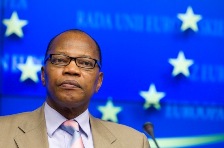EU still needs ACP, says Secretary General
 Brussels, 18 April 2012/ ACP: Opportunities for trade in natural resources and wide geopolitical influence are some reasons why the European Union should keep its current partnership with the trans-regional African, Caribbean and Pacific (ACP) Group of States, says its top official.
Brussels, 18 April 2012/ ACP: Opportunities for trade in natural resources and wide geopolitical influence are some reasons why the European Union should keep its current partnership with the trans-regional African, Caribbean and Pacific (ACP) Group of States, says its top official.
Secretary General Dr Mohamed Ibn Chambas stressed the risk in misjudging the potential of the 79-member Group as an international partner, at a workshop hosted by the Commonwealth Secretariat in London. Ambassadors, experts and scholars gathered on 16 and 17 April to assist the ACP’s Working Group on Future Perspectives “in-depth brainstorming” on policy options for the Group.
After several decades of benefitting from a series of special partnership agreements with the EU, now embodied in the Cotonou Accord, the ACP Group is weighing up its future as an institution after the Cotonou expires in 2020.
“With Europe’s aging population and its current fiscal and institutional challenges, the growing economies of the ACP constitute a potentially huge market and investment opportunity that could help restore the Old Continent to the path of long-term growth,” said Dr Chambas in his opening remarks. (Read the full speech here)
“Europe has technology and skills, while the ACP has an abundance of natural-resource endowments. There is therefore a basis for interdependence and mutuality of interests….
We also believe that Europe will continually need the ACP to validate its evolving role as a global actor in international relations. As principal donor to the ACP, the EU has access to 79 member countries within its sphere of diplomatic and geopolitical influence.”
Dr Chambas said there were concerns from some ACP member states of a “possible downgrading” of the ACP-EU Partnership, in light of recent shifts in Europe’s international policies. For one, there is no mention of ACP-EU relations in the 2009 Lisbon Treaty, the constitutional blueprint of the European Union.
Difficult trade talks on the Economic Partnership Agreements, the refocus in EU policy orientations on Eastern Europe and North Africa, as well as a stronger pull to Latin America has led to “considerable anxiety” in ACP circles of the future rapport with their main development partner.
But the Secretary General underlined the importance of the partnership, pointing to times when the ACP Group’s used its large membership and moral authority to support EU international agendas. A “new window of opportunity” for complementary alliances could also be found in the rise of the emerging economies in Asia and Latin America.
“The ACP must take full responsibility for their own future, building on their own inner resources and collective strength; and leveraging on their moral capital as the largest coalition of the world’s poor,” he said.
Workshop participants included, amongst others, Commonwealth Secretariat Deputy Secretary-General Mrs Mmasekgoa Masire-Mwamba, Director of Economic Affairs at the Commonwealth Secretariat Dr Cyrus Rustomjee, Head of Trade & Regional Cooperation Edwin Laurent, Professor Keith Nurse (University of the West Indies), Professor Ruth Okediji (University of Minnesota), Former Minister for Trade from Samoa Mr Hans Joachim Keil, Chairman of the Ambassadorial Working Group on the Future Perspectives of the ACP Group H.E Patrick I Gomes, as well as several Ambassadors from ACP member states.
The Working Group will ultimately submit a report on their findings to ACP Heads of Government.
(Pictured: Secretary General of the ACP Secretariat H.E Dr Mohamed Ibn Chambas/ Photo by The Council of the European Union)
– ACP Press
